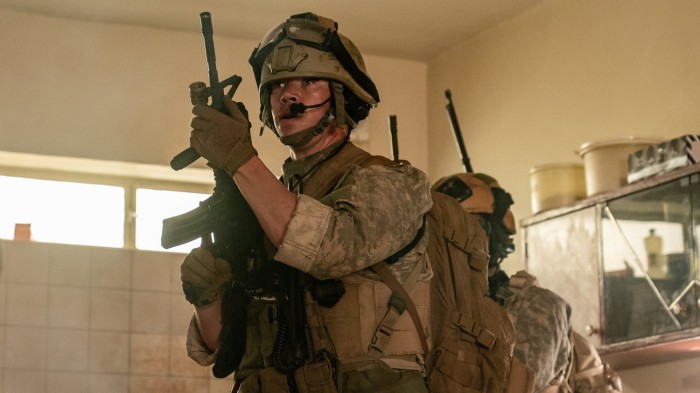Stay informed with free updates
Simply sign up to the Film myFT Digest — delivered directly to your inbox.
Civil War has been and gone. This time last year, British director Alex Garland released a movie of that name made to speak loudly to the moment: an attention-grabbing vision of a US sundered by political violence. Twelve months on, who knows what movie could possibly capture the shape of America in 2025. But that one? Not quite.
Yet Garland now fights on with Warfare, another tale of American bloodshed. You might see it as a companion piece, if far less gaudy — and fixed on the past, not the looming future. It takes us back to the hard ground of documented reality: 2006 and occupied Iraq.
The second film is better than the first. There has also been a change in credits. Garland now writes and directs alongside Ray Mendoza, his military adviser on Civil War, whose time as a Navy Seal in Iraq informs a story modelled on a real operation. And the cadence here is nothing if not real.
Early on, a nondescript house in everyday Ramadi is taken over by a group of Seals. None get much introduction, though you may note British actor Will Poulter, cast as team leader. But his colleague Cosmo Jarvis claims the initial focus as a sniper, prone and still, tracking figures in the middle distance who may or may not be planning hostilities.
For a long time, that is essentially that. Slowly, slowly, tension simmers. Expertly too. It isn’t meant as a jibe to say you feel your legs numb in sympathy with Jarvis. This is warfare, the film says, or at least a serious part of it: a grim waiting game, deadly dull.
The wait does end — viscerally. The rest is a frantic siege movie. You could condense the story into a sentence, but Garland and Mendoza have such a taut hold on the material, seconds take on the drama of epics. The film is really very well made. We become deeply attuned to the sight lines and corners of this confined space, while also never knowing what is coming around them. Detonations shudder; silences descend. Someone screams for morphine. To risk a crass turn of phrase, the movie doesn’t waste a shot.
The effect is brutal. In 95 minutes of what feel like real-time events, you are left no headspace for more than the moment you’re in. The actual troops surely felt the same. As with that long jitter of an opening, the whole sell is the authentic — the immersive, even. You are here: like Ridley Scott’s Black Hawk Down stripped back to a couple of small boxy rooms.
So it may only be on leaving, wrung out, that you wonder what the film wanted to tell you while you were there. There must be more at stake here than sensory cosplay. War is hell? It never ages as a statement. You may squint, though, at who it is hell for. The wider context of the Iraq occupation is left well alone. As with Civil War, Garland has an allergic dislike of being seen to have a point of view. But the Iraqis on screen largely take the same role that Native Americans once did in cowboy movies.
That said, Garland and Mendoza present their Seals with a pointed lack of back-story too. Still, humans being human, we root for people we see in peril, holding their nerve and having each other’s backs.
That there’s no such thing as an anti-war film is a cliché for a reason. It may ask a lot of the young audience prized by backers A24 to know that a war fought when they were toddlers is now a byword for futility. The same might be true of expecting them to see this movie filled with heart and camaraderie, and realise they’re watching a cautionary tale.
★★★☆☆
In US cinemas now and in UK cinemas from April 18
Read the full article here

